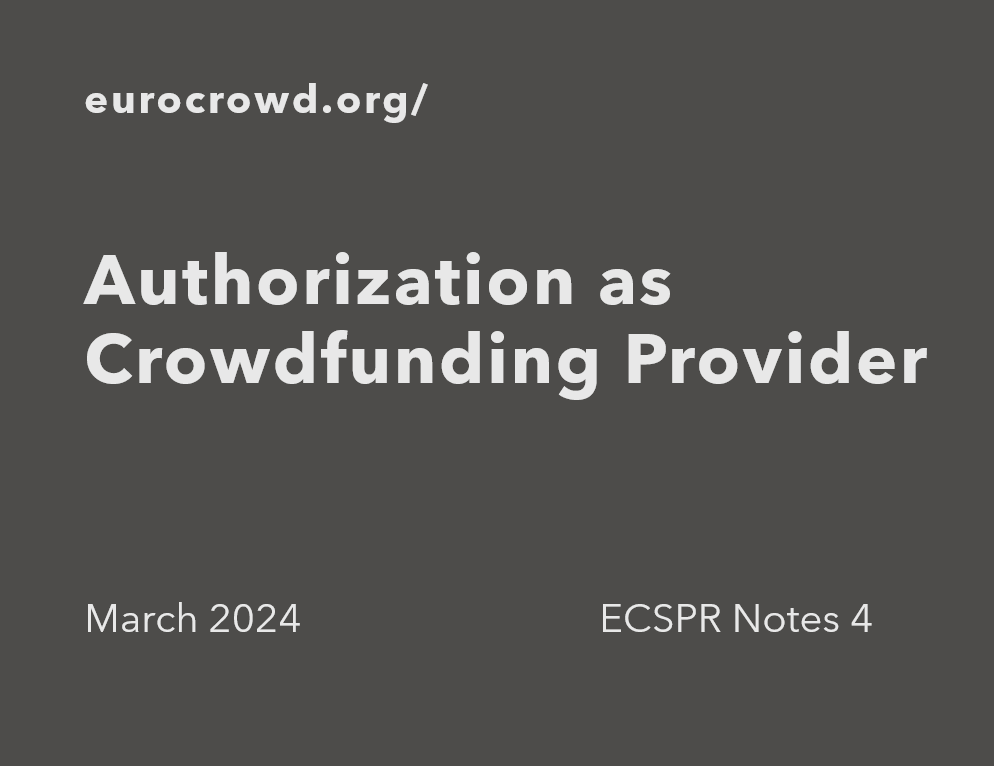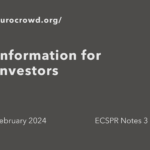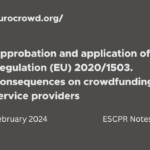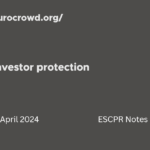ECSPR
Authorization as Crowdfunding Provider

If you are a crowdfunding platform, an entrepreneur, or an investor, then you should look these series of articles on the European Crowdfunding Regulation (ECSPR).
The ECSPR is a game-changer. It harmonizes rules across the EU, creating a level playing field for crowdfunding services. In these notes, we break down the jargon, demystify legal intricacies, and provide practical insights.
Today we are going to talk about the information for investors. Crowdfunding platforms act as financial gateways, requiring transparent information to ensure investors make informed decisions, not ones based on hype or hidden risks. Fair and objective presentation safeguards both investor trust and the platform's reputation.
Compliance isn't optional; it's crucial. Be empowered with knowledge with EUROCROWD.
Fourth
Authorizations under ECSPR
Up to what point are authorizations required under ECSPR?
This is a question that is always on the minds of platforms. In fact, the ECSPR has been approved to control the crowdfunding field in Europe. The aim of this regulation was not only to create a real pan-European crowdfunding map, but also to build a safer scenario for investors.
Authorization as Crowdfunding Provider
The importance of authorization can be found in Article 3:
"…Crowdfunding services shall only be provided by legal persons established in the Union and authorized as crowdfunding service providers…"
Here's a breakdown:
- Only legal entities: Individuals cannot offer crowdfunding services.
- Established in the EU: They must have a physical presence within the European Union.
- Authorized: They must obtain an authorization to operate as a crowdfunding service provider.
What are Crowdfunding Services?
According to Article 1 ECSPR, a "crowdfunding service" means the matching of business financing interests of investors and project owners through the use of a crowdfunding platform and consists of any of the following activities:
- Facilitating the provision of credit.
- The placing, without a firm commitment basis, of transferable securities and instruments admitted for crowdfunding purposes issued by project owners or a special purpose vehicle, as referred to in point (7) of Section A of Annex I to Directive 2014/65/EU, and the reception and transmission of client orders, as referred to in point (1) of that Section, in relation to those transferable securities and instruments admitted for crowdfunding purposes.
A "crowdfunding service" connects investors and project owners through an online platform to raise funds. It can involve:
- Facilitating loans: Matching investors who want to lend money with project owners needing it.
- Selling investment opportunities: Offering shares or other securities in projects to investors, without guaranteeing they will buy.
- Handling investor orders: Accepting and passing on investor requests to buy these crowdfunding securities.
This definition clarifies the different activities a crowdfunding service can perform by connecting finance seekers with potential backers.
Scope of the authorisation
Now that we have the authorization, the question is: Does this authorization have a limit?
The answer is yes.
Article 13 lays down that crowdfunding service provider licenses must clearly state which services the provider can offer. In this sense, if crowdfunding service providers want to offer new services not originally approved, providers need to request an extension and provide additional information. This ensures transparency and regulatory control.
Changes in the conditions of the authorisation
Crowdfunding service providers shall notify the relevant competent authority of any material changes to the conditions for authorisation without undue delay and shall, upon request, provide the information needed to assess their compliance with this Regulation.
Cross-border provision
As I said at the beginning of this reading, one of the goals of ECSPR approval is to make it easier for crowdfunding service providers to provide cross-border services.
A crowdfunding service provider duly authorized can offer services in other member states by simply notifying the relevant authorities. Certain information must be submitted to be shared with authorities and a central register. Then, they can start operating after receiving confirmation or after a short waiting period. This simplifies cross-border operations within the EU.
Withdrawal of the authorisation
Platforms should also know when their authorization will be withdrawn. The regulation also gives us some answers. For example, the competent authorities which granted authorisation can withdraw the authorisation where the crowdfunding service provider has not used it within 18 months of the date of granting of the authorisation.
Right of appeal
Member States shall ensure that any decision taken under ECSPR is properly reasoned and is subject to the right of appeal before a tribunal.
The right of appeal before a tribunal shall also apply where, in respect of an application for authorisation which provides all the information required, no decision is taken within six months of its submission.
Register of authorised crowdfunding service providers
ESMA has a register of all crowdfunding service providers. That register is publicly available on its website and shall be updated on a regular basis. On the same page, any withdrawal of authorisation of a crowdfunding service provider shall be published, and remain published, for five years.
Conclusions
- Only legal entities established in the EU need authorization to operate as crowdfunding service providers.
- Authorization scope is limited to approved services. Expansion requires additional approval.
- Changes to authorization conditions must be promptly reported.
- Cross-border operation is simplified with notification and waiting period.
- Authorization can be withdrawn for inactivity or non-compliance.
- Appeals for decisions and lack of response are possible.
- Public register tracks authorized and withdrawn providers.
Opinion from the author
According to what has been explained in this reading, I find it difficult to share the opinion of some colleagues that a European crowdfunding platform, which is within the margins of the ECSPR, should not have an authorization to provide services. As we have seen, it makes no difference whether the services are provided only on national territory or cross-borders. Obviously, it will always have to be a case-by-case approach for each platform, but looking for shortcuts to a past scenario will never be a good idea.
Connect with Us: Have questions? Need personalized advice? Reach out: we're here to help!



